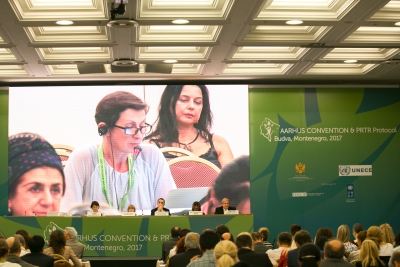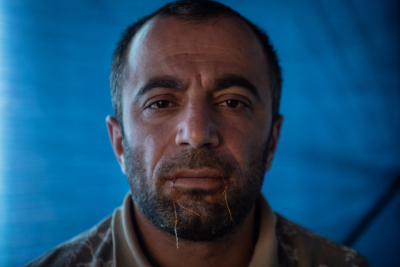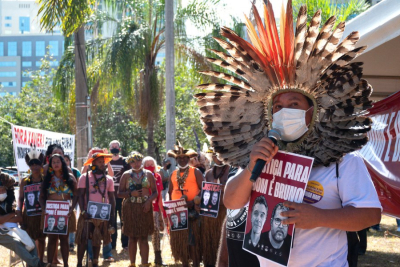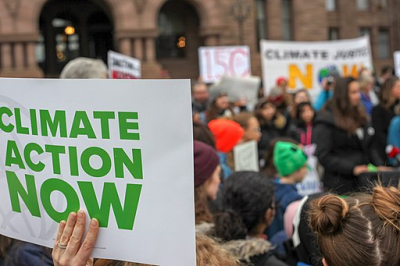The ministers and heads of delegation from signatory countries to the Convention are “particularly alarmed” by the increase in the harassment, silencing and even murder of environmental activists around the world, says the Thursday’s declaration welcomed greatly by non-governmental organizations.
“Reaching sustainable development goals envisaged by the United Nations is not viable without broad involvement of citizens. Increase in harassment of environmental defenders puts serious obstacles on dealing with environmental issues in many countries,” explains Martin Skalsky of Czech NGO Arnika. “We welcome recognition of the issue by the parties to the Aarhus Convention and their commitment to stop the persecution,” he proclaims.
New testimonies of serious harassment of environmental defenders were reported in last few days on www.stop-persecution.org website, launched recently by Arnika together with partnered Belarusian NGO Ecohome. Beating in Ukraine, police violence and false accusation in Bosnia and Herzegovina or state bodies bullying in the Czech Republic, Macedonia and Kazakhstan can be read.
Belarus is guilty of persecution, the conference claims
The governments also adopted the decision on the first case on harassment of environmental defenders that was ever brought to the Aarhus Convention Compliance Committee. They confirmed that Belarusian state bodies persecuted activists opposing construction of the Ostrovets nuclear power plant in 2012.
“Although the controversial construction continues, this decision is essential for the future. International community recognized that governments shall not obstruct the people from access to information and participation in decision making,” Marina Dubina of Ecohome states. “We are surprised by the number of other cases reported recently from various countries that simply confirm importance of the issue,” she adds.
Another discussed case is a very recent one of police violence against the citizens in the village of Kruscica in Bosnia and Herzegovina. Viktor Bjelic, director of Center for the Environment, informed the delegates: “On Tuesday, the police riot stroke the bridge blocking residents, who were protesting against hydropower plant construction. The permitting process was full of irregularities, suffered by low public involvement and breached the Aarhus Convention,” Bjelic said.
The non-governmental organizations raise the question of quick reaction to the cases of harassment on international level. “While the investigation of the Aarhus Convention Compliance Committee might take several years, imprisoned, threatened or violently attacked people need rather immediate help. Establishment of such mechanism is a challenge for the Aarhus Convention in the future,” Skalsky concludes.
More photos from the MOP to the Aarhus Convention available HERE
Further reading:
[1] Budva Declaration, adopted by the governments on 14 September 2017 (excerpt):
“We are particularly alarmed by the increase in the harassment, silencing and even murder of environmental activists around the world. To this end, we recall our commitment made through the Maastricht Declaration on Transparency as a Driving Force for Environmental Democracy (Maastricht Declaration) to protect the rights of environmental activists and whistle-blowers. We also recall the resolution of the Human Rights Council on protecting human rights defenders, including those addressing environmental issues.
We call upon Parties to ensure due protection of environmental activists, whistle-blowers and NGOs so that they can exercise their rights under the Aarhus Convention and its Protocol on Protocol on Pollutant Release and Transfer Registers without being threatened in any way.”
[1] ENG 26/5/2017 Draft Budva Declaration on Environmental Democracy for Our Sustainable Future (UNECE)
[2] Aarhus Convention on environmental democracy is an UNECE document signed by 46 countries and the EU. This week a Meeting of the Parties to this international agreement is held in Budva, Montenegro. Access to information together with public participation on decision making and judicial protection are being discussed on the conference.
[3] ENG 6/9/2017 “Stop the persecution of environmental activists!” a new website for whistle-blowers appeals (Stop Persecution)
[4] ENG 31/7/2017 Draft decision VI/8c concerning compliance by Belarus with its obligations under the Convention (UNECE)
[5] ENG Antinuclear activists in Belarus (Stop Persecution)





